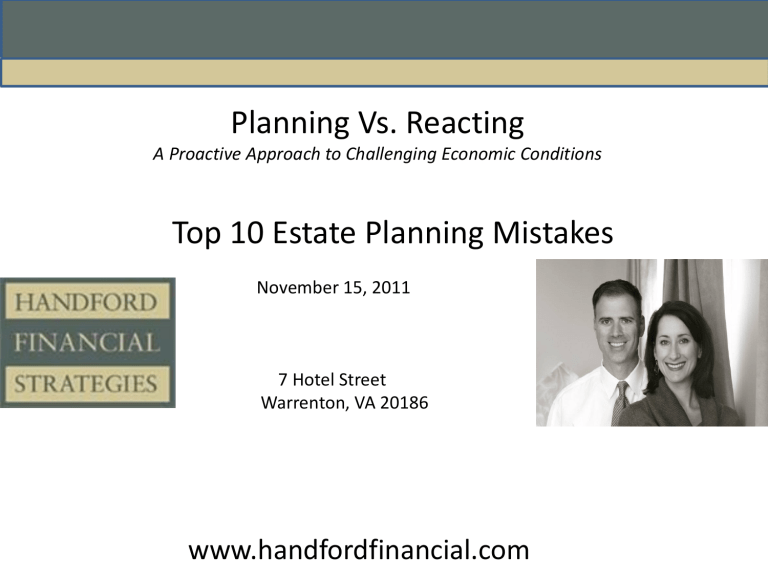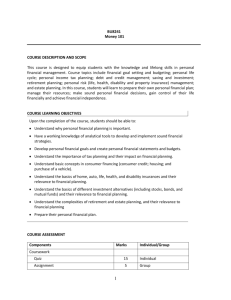Planning Vs. Reacting and Top Ten Estate Planning Mistakes

Planning Vs. Reacting
A Proactive Approach to Challenging Economic Conditions
Top 10 Estate Planning Mistakes
November 15, 2011
7 Hotel Street
Warrenton, VA 20186 www.handfordfinancial.com
Macro Economic Strife
Board of Certified Financial Planners
Investments
Risk
Management
Estate
Tax Efficiency Retirement
A Clear Path
Choices, Wrong Turns, Indecision
Healthy Habits
Unhealthy Habits
Board of Certified Financial Planners
Investments
Risk
Management
Estate
Tax Efficiency Retirement
Emotional v. Rational
A Solid Plan
Planning Vs. Reacting
A Proactive Approach to Challenging Economic
Conditions
Name That Feeling
The Emotional Reality
• You are not alone.
– Fear and anxiety have become commonplace as the market continues to experience periods of fluctuation.
– The reality is that your investments have likely declined along with the overall market performance.
• An emotional response is a natural response.
– We’re humans, not machines! Emotions will always play a role in how we deal with challenging situations.
– But how can we acknowledge our emotions and still manage our finances?
• Take some time to verbalize how you feel.
– Sometimes simply stating how you feel or writing it down can help release the tension.
– Once you’ve respected the emotion, you may be able to focus on action.
666
S&P 500
1565 October 9, 2007
666 March 6, 2009 (57.44%)
1250 November 8, 2011 87%
What’s the Secret to Worrying Less?
• No magic bullet
• Empowerment through action
• The benefits of financial planning
– Results of a recent study* by the Financial
Planning Association and a leading financial institution
Study Statistics Worth Noting
• 50% of the planning participants feel that they are in control of their financial future.
• 9 out of 10 planning participants (88%) feel that they have clear financial direction, which is about 50% higher than those who don’t have professional support.
Study Statistics Worth Noting continued
• Planning participants are 50% more likely to say their goals and dreams are financially secure.
• 42% of planning participants feel extremely or very prepared for retirement (vs. 16% of those without an advisor).
What’s Most Important to You?
• One benefit of planning is that it gets you thinking about what is really most important to you.
• Your concerns over your finances are likely more specific than
“I want more money.”
– What is the “why?” behind your goals?
• What is meaningful to you may not always be quantified in dollars and cents.
Important, Intangible Goals
• We already mentioned that some of the items that are important to you are going to be less tangible, like:
– Family
– Community service
– Leaving a legacy
• These intangible items can be reframed in terms of quantifiable financial planning goals, like:
– Protecting your family by having adequate insurance
– Leaving behind a legacy with a properly structured estate plan
– Giving back to your community with a charitable trust
A Methodical Approach to What-If
Worries
• It’s normal to question how things would look for you if different variables changed.
– How will adjusting certain goals for time and cost impact your ability to attain them?
– What if you were to save more and spend less?
– What if you had to save less?
– What if your investments declined more or less over time?
• A Monte Carlo simulation can provide perspective
– Takes into account the bad years (kind of like what we’re seeing now) and shuffles the cards in order to convey a realistic expectation of what could happen based on different scenarios.
A Written Financial Plan
• Road map to your goals
• Includes probability of reaching goals based on testing
• Living, breathing document
– A good plan is updated regularly—typically annually—to ensure that it still matches your current situation and accounts for any changes.
– A financial professional monitors the plan and keeps you on track with your goals.
– Just like no two clients are alike, no two plans are alike!
The Planning Process
You Don’t Have to Go It Alone
• Taking control does not mean you have to uncover all of the solutions on your own.
• A financial professional can assist you with:
– Goal definition
– A written financial plan
– Financial planning for
• Estate plan coordination
• Retirement income planning
• Charitable giving
• Risk management
• And . . . everything else!
• Proactive planning = Less anxiety
Top 10 Estate Planning Mistakes
We Hear About Celebrities’
Problems . . .
Name
W.C. Fields
Humphrey Bogart
Clark Gable
Walt Disney
William Boeing
Estates of Famous People
Estates that made use of the marital deduction
Gross Estate Settlement Cost Net Estate % Shrinkage
$884,680
$910,146
$329,793
$274,234
$2,806,526 $1,101,038
$23,004,851 $6,811,943
$22,386,158 $10,589,748
$554,887
$635,912
37%
30%
$1,705,488 30%
$16,192,908 30%
$11,796,410 47%
Name
Marilyn Monroe
Estates where the marital deduction was not used or unavailable
Gross Estate Settlement Cost Net Estate % Shrinkage
$819,176 $448,750 $370,426 55%
Elvis Presley
J.P. Morgan
Alwin C. Ernst, CPA
$10,165,434 $7,374,635
$17,121,482 $11,893,691
$12,642,431 $7,124,112
Frederick Vanderbuilt $76,838,530 $42,846,112
$2,790,799
$5,227,791
$5,518,319
73%
69%
56%
$33,992,418 56%
Source: Public Probate Records. Under current laws the costs would be different.
Could That Happen to Us?
1. Failure to Plan
• State intestacy laws determine whom will inherit what.
1. Failure to Plan continued
Other considerations:
• Court-appointed guardians and executors
• Additional expense and time required to distribute property
• Missed opportunity to minimize taxes
• State may become beneficiary
2. Failure to Implement
• Misconception: once documents are executed, process is done
• Reviewing and re-titling assets and reviewing beneficiary designations
• No implementation may result in ineffective plan (see #1)
3. Failure to Update
Triggering life events:
• Marriage
• Divorce
• Birth
• Death
3. Failure to Update continued
Other triggers:
• Change in law
• Change in asset value
• Change in goals
4. Failure to Review Beneficiary
Designations
• Easiest way to derail a plan
• Perform an audit:
– Life insurance
– Retirement accounts
– Nonqualified annuities
– Transfer-on-death accounts
– Trusts
– Wills
– Special needs
5. Failure to Understand the Plan
• Allocation of assets between spouses
– Portability provision
• Structure of policies and titling of assets
– Joint tenancy with right of survivorship
– Community property vs. separate property
– Contractual agreements
6. Failure to Make Lifetime Gifts
• Leveraging gift tax exemptions: a simple and cost-effective way to reduce estate value
• Irrevocable life insurance trusts (ILITs)
• 529 plans
7. Choosing the Wrong Fiduciary
• Inexperienced, unqualified, or self-serving
• The “bad guy”
• Family conflict
8. A Plan That’s Too Simple
• All-to-spouse or joint ownership arrangements
• Unintended beneficiaries
• Lack of efficiency
• Effort to save hundreds costs thousands
9. A Plan That’s Too Complex
• What are the goals?
– Asset protection
– Liquidity
– Efficiency
– Control
• GRAT, CLAT, FLP, CRUT . . .
• Administrative duties
10. A Plan with No Flexibility
• Must be able to change in light of circumstances
• What does irrevocable mean?
• Trustee discretion
Planning Vs. Reacting
A Proactive Approach to Challenging Economic Conditions
Top 10 Estate Planning Mistakes
November 15, 2011
7 Hotel Street
Warrenton, VA 20186 www.handfordfinancial.com







